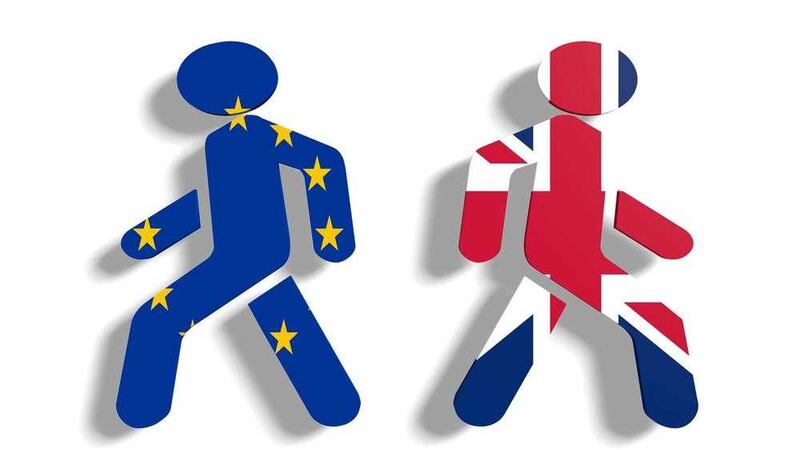IN a recent Danske Bank poll 26 per cent of 1,000 people surveyed across Northern Ireland said they didn't know how they should vote in the Brexit referendum on June 23. Yet this referendum is probably the single most important issue we and the whole of the UK has faced for decades.
Northern Ireland’s membership of the European Union, as part of the UK, has helped define us in many ways – influencing how we approached human rights, the peace process, employee rights and environmental protection.
In economic terms too, our membership has brought this small region from Objective One status as one of the most deprived regions in Europe back in the 1970s and 1980s to much higher levels of economic growth and development. Economic development in Northern Ireland has been supported for decades by the EU’s Cohesion Policy which is a policy with the stated aim of reducing economic disparities between regions and improving overall well-being for all regions.
Finding an economist that supports the UK leaving the European Union is relatively difficult. Indeed a recent Financial Times poll found that for every economist that supported a Brexit nine times as many wanted to remain in the European Union.
The reasons are obvious. Economists, like most businesses, do not like uncertainty and a Brexit would bring with it untold uncertainty. For example, if Britain were to leave the EU there are so many questions that the Brexit supporters simply cannot provide answers to. These include:
:: How long would it take to build up new trade deals with the EU and with other countries around the world? For Switzerland it took nine years.
:: How long would it take (and much would it cost) for the UK to start re-building its network of foreign offices around the world?
:: By how much would investment fall during this period of uncertainty (domestic and foreign direct investment)?
:: As investment drops back between 2016 and 2018 and consumer confidence falls due to the uncertainty, how would this impact GDP levels across the UK?
:: What tariffs would be imposed on our exports and imports when we are no longer part of the European free-trade agreement?
:: How would these tariffs on our imports impact household inflation levels?
:: By how much would the Bank of England have to raise rates to control rising inflation stemming from higher trade tariffs and the weaker currency?
:: Sterling would be expected to depreciate but by how much? Goldman Sachs have estimated that the pound and sterling assets could depreciate by up to 20 per cent. What levels of capital flight would we expect and how could we reduce it?
:: How would we stop financial institutions in the UK from fleeing to Frankfurt, Paris or even Dublin?
:: As the cost of borrowing international money rises for the UK alongside its rising risk profile, how does the government fund the deficit?
:: As Northern Ireland receives higher levels of funding from Europe in the form of CAP, structural funds and Peace and Reconciliation monies, will the
Treasury be prepared to give us a top-up for the lost EU funding? The UK government already thinks we get too much public funding as it is.
:: How will a Brexit impact trade between the north and the Republic? Will border posts/customs posts be re-erected?
:: How would a Brexit impact on the local labour supply, with many local companies very reliant on European workers (particularly in agri-food production, hospitality and local universities)?
:: Would the UK government be able to replace Horizon 2020 funding for university research projects?
:: The UK could potentially save £8 billion a year from not having to contribute to the EU budget. But by not being an EU member but how much will it lose in terms of lower trade, lower investment, higher borrowing costs, higher inflation for households and lower GDP?
A new model of how we would trade after a Brexit has never been presented by the 'Leave' campaigners. Some have mentioned Norway as an example of a country that is not an EU member but has a trade deal with Europe.
But Norway still has to pay into the EU budget (it was the 10th highest per capita contributor to the EU between 2009 and 2014). In addition, Norway has to adhere to 75 per cent of the EU rules but has no influence over them, so following this model would seem to make little sense.
Others have suggested the Swiss option as a solution. The Swiss have a complex series of 17 treaties in place and over 120 bilateral agreements, which took nine years to negotiate and implement. If the UK pursued this course, what would happen in the interim years as we wait for lawyers to agree these new detailed trade deals? Furthermore, the Swiss must keep to most of the single-market rules and contribute to the EU budget.
Most rational people tend to fear the unknown. Walking away from a free trade agreement with the world’s largest market – some 500 million people - is sufficiently risky without the added problem of not having a back-up plan in place.
The economic arguments for staying in Europe are compelling – lower inflation, ease of trade, higher foreign direct investment, higher GDP and lower borrowing costs. The political arguments for having close ties with other liberal, democratic countries, where corporate governance is high and human rights are respected is, in my opinion, also compelling.
I believe that at a time when the safety and security of global citizens is under threat, we need to be strengthening alliances and institutions with civilised countries, not isolating ourselves and potentially tipping the country into recession.
:: Angela McGowan is chief economist at Danske Bank in Northern Ireland.
:: Next week: Richard Ramsey.







